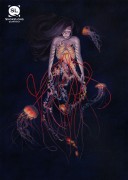Your story, “Daddy’s Boy,” devastated me when I first read it, flooded me with discomfort. I had to step away and think about it, come back to it and read it again and then sort through competing emotions: admiration, disgust, sympathy. What sort of effect were you hoping to achieve with this story?
Well first, thank you so much for saying that, and for your kind words regarding “Daddy’s Boy.” This is a really satisfying question to consider because it tells me that as a reader this story asked you to work to receive it. Which is exactly the effect I’m hoping to achieve with everything I write. When I’m reading, the stories and novels that impact me the most allow me to work in partnership with the writer–in a very intimate way–and in that relationship, our combined efforts make the reading experience worthwhile. I hope a reader will return to my work, will need to do so, and will find something new, or deeper, or more challenging with each read, the same way that I do with the stories and novels that I hold most dear. But that means I have to do my part and deliver that story, which as I’m sure you know, is really hard to do.
That said, that’s about as far as I go in terms of thinking about the effect I’m hoping to achieve. With this story, I knew I wanted something a reader would have to work for, something that would be surprising, complex, and extremely intense.
What was the origin of the story? Was it something that came to you all at once, or did it develop more slowly over time? And is this a piece that is connected to others (emotionally or otherwise) or does it stand on its own?
I went to a poetry reading last summer, I think in June. It was wonderful, an open-mic salon of sorts, and a friend of mine read a new poem he’d written that absolutely slayed me. I mean just killed me dead on the spot. I remember it being very different in tone from this piece–very loving, very soothing, very delicate, but rife with tension. I couldn’t remember ever encountering a piece of writing that so intimately captured the beauty of two men making love, and the simultaneous power and shame that might be felt by, or placed upon, the receptive partner. So the next morning, I started trying to write with that particular tension in mind, but immediately, from the first sentence what arrived was rather different in feeling, in tone. I loved the first two sentences, so I went with it.
It was written very quickly, I think within 2 or 3 days. When I write flash fiction, it usually arrives fully-formed, and I trust that if I can excavate the right sentences from wherever they come from, the rest will take care of itself. I wanted the story to be closer to 10 pages, but when I completed part 2, I knew I’d reached the end.
Tension between black fathers and their sons–both collective and individual shame–is a theme that shows up in virtually all of my work at the moment. It’s in my stories, and it’s one of the central areas of conflict in the novel I’m currently working on, so emotionally, thematically, this story is very deeply connected to my other writing, though I consider it a stand-alone piece.
Tension between black fathers and sons is such a raw, fertile area for fiction and one I often come back to. Have you ever interrogated your fascination with this theme? How does it play into your novel?
I should probably clarify that I write primarily about the tensions and shame that move between black fathers and their gay sons. In a larger way, I’m very interested in power dynamics and the ways in which they play out in our lives, and how one’s placement on a power spectrum, so to speak, influences the way one might see the world–how they might be blind to something that is utterly undeniable to another person. I think it’s further complicated when you’re looking at power shifting between people whose identities deem them powerless within one context, but not necessarily in another.
In a more specific way, I am the gay son of a black father–a really loving, wonderful father–and while I wouldn’t call the story autobiographical in content, the themes are certainly very close to me. It’s an extremely complicated existence growing up a gay boy in the black church–not the sort of thing that has one narrative, or could be painted with one stroke. But that’s ok; it wouldn’t be worth writing about if it were simple.
And yes, these themes are all over my novel. Even though it’s incredibly painful, I love the process of writing a novel because I have so much room to work with. I can try to bring everything a character has inside of them to the page, in every moment, the same way I believe we do in life. And that is exhilarating. All I will say about this novel is that it looks closely at a black boy’s relationship with his father, and the ways in which it later impacts his marriage to a white man. I think in a lot of ways, sexuality aside, much of my writing is an homage to black boyhood–that implacable thing it seems we’re not allowed to have.
Three pieces of fiction (novel/short story/flash/poem/song/movie/whatever) that you return to: Go.
Can I give you four? Keep in mind that this isn’t an exhaustive list. I’m an obsessive re-reader.
1. The God of Small Things by Arundhati Roy–for sentences, rhythm, and cadence.
2. Going To Meet The Man by James Baldwin–for tension, affirmation, for my soul.
3. Light Years by James Salter–for sentences, for quiet.
4. Olive Kitteridge by Elizabeth Strout–for beauty, and for compassion.



 The core workshop of SmokeLong Fitness is all in writing, so you can take part from anywhere at anytime. We are excited about creating a supportive, consistent and structured environment for flash writers to work on their craft in a community. We are thrilled and proud to say that our workshop participants have won, placed, or been listed in every major flash competition. Community works.
The core workshop of SmokeLong Fitness is all in writing, so you can take part from anywhere at anytime. We are excited about creating a supportive, consistent and structured environment for flash writers to work on their craft in a community. We are thrilled and proud to say that our workshop participants have won, placed, or been listed in every major flash competition. Community works.